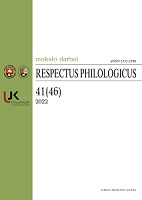Dėl bendrašaknių lietuvių kalbos daiktavardžiųsu priesagomis -(i)acija ir -imas
On Common Root Nouns of the Lithuanian Language with the Suffixes -(i)acija and -imas
Author(s): Jolanta VaskelienėSubject(s): Morphology, Syntax, Baltic Languages
Published by: Vilniaus Universiteto Leidykla
Keywords: Lithuanian language; verb abstracts; derivative synonyms; ending; suffix;
Summary/Abstract: The article discusses common root nouns of the Lithuanian language with the ending of foreign origin -(i)acija and the suffix of Lithuanian origin -imas. The study, which was based on the analysis of 406 Lithuanian words, revealed that some of the words with -(i)acija form a derivational opposition with verbs; therefore, they should be considered derivatives and that quite often, the -(i)acija derivatives form pairs of derivative synonyms with the -imas(is) verb abstracts. The meanings of nouns, and especially the examples of usage found in the corpora, have shown that in many cases, common root derivatives with -(i)acija and -imas(is) are partial synonyms: they have semantic and valency differences that are neutralized only in certain word combinations; hence, it is impossible to talk about the possibilities of substitution without restrictions. Sometimes the members of pairs of derivative synonyms differ stylistically (for example, the -(i)acija derivatives are terms); often, the frequency of use of common root derivatives also differs. It is believed that in the sources of the lexicography of the current Lithuanian language, some used derivatives or their new meanings should appear (for example, komunikavimas ‘communication’, mutavimas ‘mutation’, vulgarizavimas ‘vulgarization’ and their base verbs).
Journal: Respectus Philologicus
- Issue Year: 2022
- Issue No: 41(46)
- Page Range: 94-106
- Page Count: 13
- Language: Lithuanian

